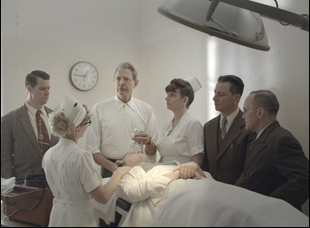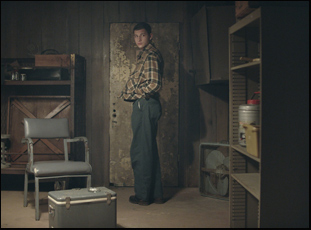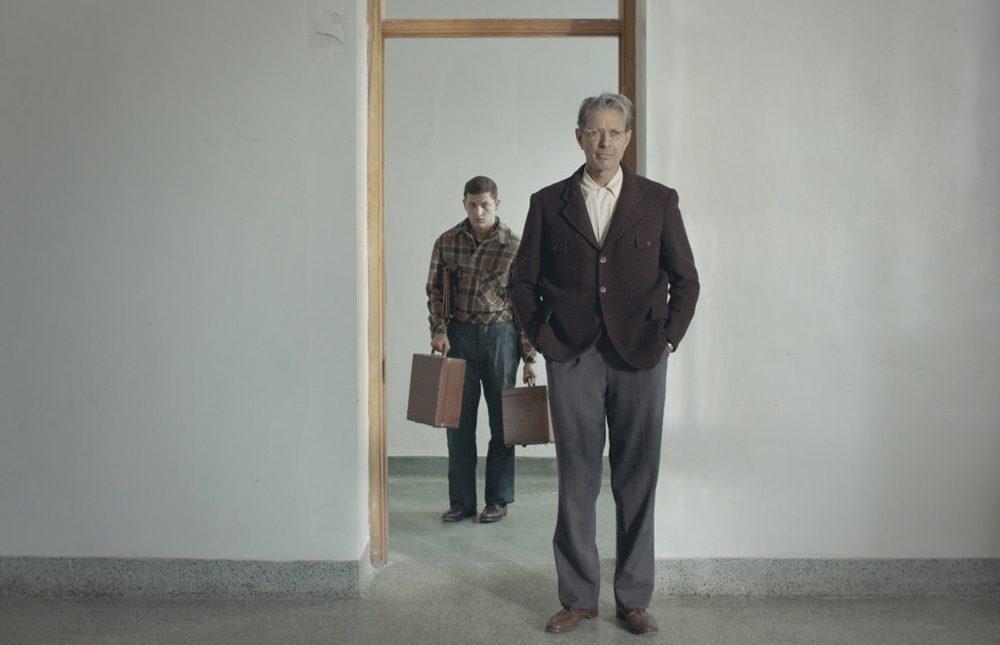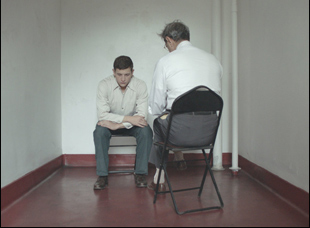There’s always been a tension between the images that Rick Alverson creates and the characters that find themselves inside of them. They have been movie stars, but only in their own head in films such as “The Comedy,” in which Tim Heidecker wandered around Brooklyn running out the clock to receive his inheritance, though he acts with an arrogance as if he has it well before any body can be cold, or in the case of his last film “Entertainment,” where Gregg Turkington, doing a riff on his abrasive insult comic character Neil Hamburger, traversed the desert, the only place where he could consider himself a headliner when he had little competition for attention. While other filmmakers would be tempted to join in their characters’ delusions by projecting what they see, Alverson has curiously avoided sharing their perspective, contrasting their uniquely American sense of entitlement with seeing the world as it really is, almost clinical in its cultural traditions and rules where irrational confidence and certitude can easily be mistaken for authority worthy of respect and deferred to.
Although Alverson lost his illusions long ago about the country he calls home, it was always going to be interesting to find out how he’d respond when that veneer had worn off for so many others, to the point his prophetic visions could be seen as stating the obvious. It turns out the answer lies in the past when the American dream was arguably at its most potent in “The Mountain,” the writer/director’s most impressive work to date set during the 1950s where he finds a young man named Andy (Tye Sheridan) who after recently losing his father (Udo Kier) finds work as an apprentice for Dr. Wallace Fiennes (Jeff Goldblum), a surgeon who performs lobotomies. The practice itself may be questionable, as the necessity of what Dr. Fiennes does comes under scrutiny when drugs appear to be more effective, but his insistence that Andy takes pictures of his patients seems akin to stealing their souls before laying upon his table, and Andy can only wonder whether his mother who died after being institutionalized was subjected to similar treatment.
“The Mountain” is filled with grandiose images, from the ice skating salute that commences at the funeral of Andy’s figure skating father to the pageantry of Kiwanis Club meetings, but they ring strangely hollow when juxtaposed with the emptiness that would seem to consume Andy, who finds a kindred spirit in one of Dr. Fiennes’ patients (Hannah Gross) set to go through shock treatment and the film takes the form of jolts to the system, surveying the health of a society that readily leaves so many behind that don’t fit in and celebrates those who offer promise rather than proof. It’s a provocation that becomes more satisfying as it increasingly unsettles and while it asks far more questions than it answers, Alverson graciously took the time to give some thought to a few, from disrupting predominant narrative strategies in film to upending a greater cultural story we tell ourselves.
I’ve had an interest and a tendency to dig into some of the different aspects of American utopias, whether it was the privilege and absence of knowable limitations of the protagonist of “The Comedy” or the purgatory of the protagonist of “Entertainment” and this is a kind of origin story of some of our ills, particularly the cancer of masculinity and this event in the American psyche of lunging headlong into the future into progress without any awareness or capacity to deal with the ramifications of that event. The historical figure of Dr. Walter Freeman, who Dr. Wallace Fiennes [the lobotomist played by Jeff Goldblum] is loosely based on, is very much in that pocket. There are elements of the fraudulent in any sort of successful entrepreneurial intelligence in the history of America and they all fascinate me and I think a lot of our ills as a nation are rooted in those worlds.
Did the past hold appeal as a storyteller when these illusions of America seem to be wearing off so prominently in the present?
It’s both wearing off and fortifying itself in our cauldron of idiocy. [laughs] Through the Obama presidency, I think there was a collective kind of release for people that aren’t isolated and have exposure to diversity and modernity and the nuances of the world that we were freeing ourselves from some of the antiquated moral universes that we used to live in and joining the modern world. But it seems that was a bit of a fantasy for us all. [Again,] we got a little ahead of ourselves, which is in the habit of the American psyche.
Was it difficult to find an aesthetic to convey the beauty of an idea while showing its unromanticized reality?
Yeah, I’ve been thinking a lot about the strategies in the film to interrupt narrative and to analyze narrative as a problem or have the narrative ask itself some questions by the nature of the way it might break. The film is purposely opaque and with lifted blacks, so the depth is interrupted and our easy access to the content is interrupted. And there’s purposefully artificial constructions of the institutions – these wax tableaus that feel kind of plastic and fake intentionally. There’s so many depictions of the midcentury [America], even if in the content we’re showing the supposed problems with that era and the suppressions and the hidden secrets. Formally, they facilitate that experience [of being] very intoxicating, whether that’s “Far From Heaven” or “Blue Velvet” – I know “Blue Velvet” is set in the ‘50s, but for all intents and purposes, it operates in that space – so it was interesting to think about interrupting some of that and making us feel some of the material of the movie. My hope is to become aware of our bodies in the room [as we’re watching the movie] and taking in all of this content and I think that becomes increasingly an accessible experience towards the end when the film starts to, as some people have said, fall apart. [laughs] That act of the thing fracturing really interests me.

Yeah, to some degree, and even down to the aspect ratio. The film is made for multiple audiences, but increasingly, it bores me and makes me feel gross to just be putting things into the world that are just a solely an extension of the content of my politics – and I have a lot of politics – [and where it] completely aligns with all of my formal interests – that don’t challenge me or make me culpable or are introspective or analytical of my own problems and complicity as an audience member. So [the movie] jabs a little bit at the art film world and of the relevance or potential irrelevance of it. I haven’t talked a lot about this, but that’s definitely in there.
I was reared on films that challenged me, particularly European cinema from the midcentury on that changed the way that I looked at the world and American cinema in the late ‘60s and ‘70s, when it was really challenging the form and really trying to essentially see what vitality the form might have left. We’re so far beyond that that I think a lot of art cinema has become its own comfort mechanism. A lot of people that imbibe it are looking for the very thing that they’re trying to escape, which is luxuriating in the nostalgic, intoxicating space of that world, so the movie fucks with that a little bit and it uses characters from that world. And with all due respect – I love Udo and Lavant, I think they’re incredible cultural figures and performers – but they definitely are weaponized a little bit in the film.
It’s interesting that you say that when as uncomfortable as you could make audiences with the agitators that were central characters in “The Comedian” and “Entertainment,” you could argue it’s more uncomfortable to grapple with a character like Tye Sheridan plays where he’s so quiet and enigmatic you can easily project onto him – was that a different way for you to enter a narrative?
Yeah, the passivity of work in the film and the passivity that the film analyzes both in audiences and in the subject matter of the procedure in the movie can be an uncomfortable, dangerous thing. I think that there is an inevitable expectation of our protagonist to simply be avatars for us that we can have easy access to – sympathetic protagonists we can easily occupy and then we see the world and experience the world safely through the vehicle of their bodies and perception.
This is something that goes on all throughout consumer cinema and even contemporary art cinema and that process is totally unimpeded, so I question sometimes, what is that doing to us? That unlimited access to the world without getting our shirts wrinkled? It terrifies me a little bit. I think it might be promoting the kind of privilege and even potential bigotry in the audience has when then step into the natural world and they can’t find their tidy, sympathetic others where they’re confronted by opaque, unreadable people unlike them. Do they even consider them? Are they taught to consider them? So that was very much in our mind when we talked about making an opaque, abstract protagonist with Tye in this film.

Oh they were all tricky to shoot because we were on a very tight schedule. [laughs] But no, I mean, I’m not just an obstinate troublemaker. Those sort of things are a joy to shoot because they have an inherent formal and cinematic [quality]…they’re pleasing. With Jeff and that mirror, the focus on him and the compositional components of that scene, they’re very pleasing and those moments in the film are very important to me [because] I’m not interested in just repulsion. I’m interested in some sort of active cat-and-mouse game of attraction and repulsion over the threshold of the screen, so the short answer to this is that there are many scenes like this that are a joy to shoot.
“The Mountain” opens on July 26th in Los Angeles at the Nuart Theater and New York at the IFC Center. A full schedule of cities and dates is here.





